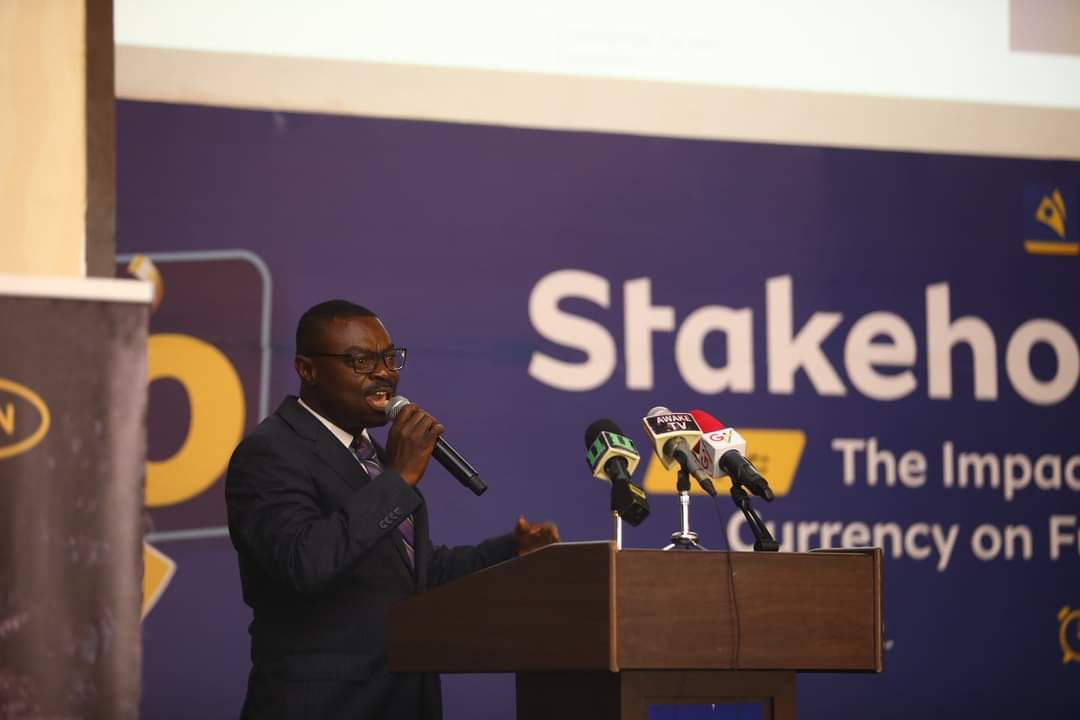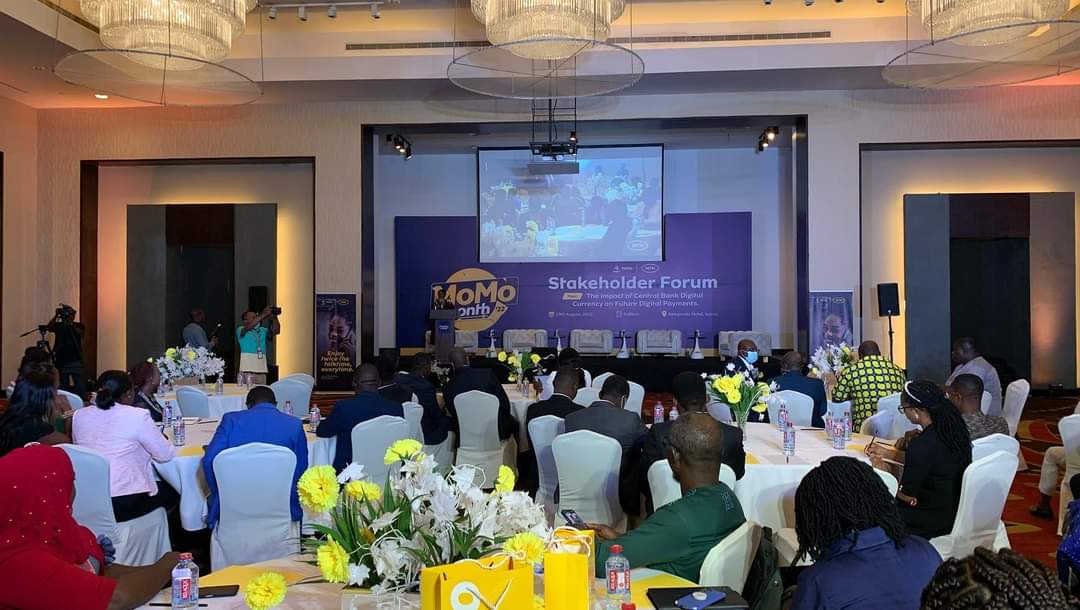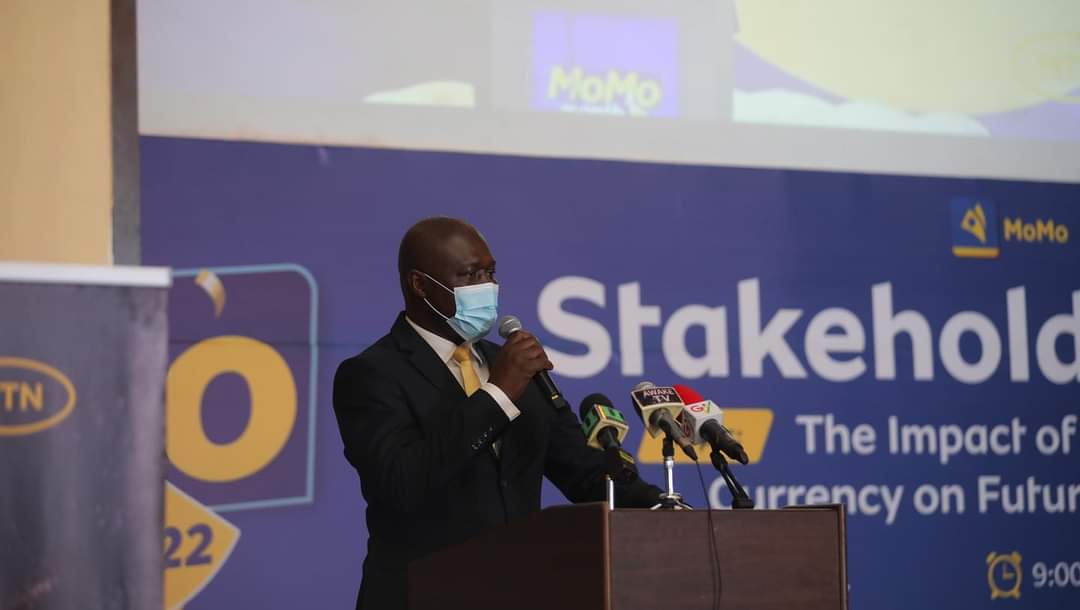
On Wednesday, August 10, 2022, Mobile Money Limited (MTN MoMo) held a Stakeholder Forum on The Impact of Central Bank Digital Currency (CBDC) on Future Digital Payments. The presentations from regulator (Bank of Ghana), telcos (MTN), banks (Calbank) and Fintech (IT Consortium) were all brilliant and on point. The Q&A session that followed was also quite engaging and insightful.
The forum formed part of MTN MoMo Month celebration, which was launched a few days back. I find the subject of discussion very relevant and worth the investment by MTN and everybody else’s while.
Very often, after such an event, the treatment would be to write one or more news articles. But for very good reasons, I have chosen to do a single news feature instead, and share some of my own thoughts from a consumer point of view. For one, the content of the four presentations were largely stuff that have been in the news for a while. What we have not really had is a closer look at what they mean for the ordinary Ghanaian consumer.
For those who still don’t know what CBDC is, let’s just say it is state-backed and regulated cryptocurrency, as the CEO of IT Consortium, Romeo Bugyei simply put it. So whereas cryptocurrencies like Bitcoin, Ether and others are unregulated and are global in character, CBDC like Ghana’s eCedi and Nigeria’s eNaira are local and regulated by central banks.
Between the four brilliant presentations, a number of things became apparent, some of the highlights including the following:
- Existing infrastructure: That BoG will depend on the existing digital payments architecture at the telco, Fintech and banks to rollout eCedi in a hybrid approach, which allows end users to remain eCedi customers of the private players and not the Bank of Ghana, and the central bank would only come in when a particular player is not living up to expectations.
- Flexibility: That unlike mobile money and other digital wallets, eCedi allows both online and offline transactions, both of which are being piloted and are going very well, which promises a gradual rollout to the general public sooner than later.
- Emerging trends from pilot: That in the pilot, one key emerging trend is users’ penchant for cashing out money from the eCedi wallets for payments instead of making payments directly from the eCedi wallet. So there are plans to educate merchants to encourage people to use the eCedi wallet for direct transaction instead of cashing out.
- Financial Inclusion: That eCedi, particularly the offline version, will deepen financial inclusion to a very large extent because even when the online version disappoints, users can still transact offline, except that there will be limits on how much one can transact offline at a given time, so that the transaction can be monitored effectively against money laundering and terrorism funding.
- No fiat against cash: That the regulator will not issue a fiat against cash, but rather issue cash and eCedi side by side to give consumers the benefit of choice at all times.
- Trust and Availability: That there is a need to deepen public education and invest into the necessary infrastructure to ensure the public trust and service availability critically needed to drive adoption.
- No interest on eCedi wallet: That eCedi wallets should not attract interest, otherwise, as CalBank’s Head of Digital and Inclusive Banking, Martha Acquaye said, they would have the potential of impacting bank deposits adversely, and that will most likely lead to high cost of lending since banks might not have enough cash to lend when customers are holding their cash in eCedi wallets and getting interest like it is with mobile money.
There was more, but here is deal as far as the end user is concerned. Since 2019, when the CBDC discussion that culminated in Bank of Ghana coming up with the eCedi began, the central bank itself and other industry experts have tried hard to draw a distinction between eCedi and Mobile Money. But one wonders if the technical distinctions they have been trying hard to point out, have any real relevance to the end user like you and I.

For instance, all four presenters agreed that one of the key elements to make CBDC/eCedi succeed is mass adoption; and according to the Deputy Head of Fintech and Innovation at BoG, Clarence Blay, that depends on Trust in and Immediate Available of the eCedi. In other words, people need to trust that eCedi is safe, secure, convenient and less costly to use. They also need to be sure that it will always be available to use when needed. Very critical.
That triggered the consumer-centric interventions from myself and a few other participants at the forum:

- How do you convince the end user that there is a real difference between eCedi and Mobile Money and that eCedi behaves exactly like cash, while mobile money does not?
- Cash, for the consumer, has no technical challenges in terms of availability to use. How do you convince the consumer that eCedi will behave the same way since it is digital and its being rolled out on the existing infrastructure with all of its technical challenges?
- When I do cash transactions, I don’t pay service fees. But when I do mobile money transaction, I do pay service fees. How do you convince me that eCedi is exactly like cash and not mobile money – does it mean there will be zero services fees when I use my eCedi wallet?
- How do you ensure mass adoption of eCedi in a situation where mobile money merchants say more than 65% of mobile money users who go to them are unable to initiate cash out, much less do money transfers by themselves?
- There were other non-consumer-central questions on how eCedi can prevent money laundering and terrorism funding among other things. That was also very important for the reason that, recently this writer gathered that one individual in Ghana was found to have engaged in money laundering via some the Fintech platform (the very architecture to be used to roll out eCedi) to the tune of GHS12 million. So, how safe are those platforms for the rollout of eCedi?
But let’s focus on the issues important for the ordinary consumer.
eCedi and MoMo
In explaining the difference between eCedi and mobile money, the various actors have in the past said, in the main, that unlike mobile money, which is linked to cash sitting in a certain account at a commercial bank, eCedi is the cash itself in its digital form. As hard as we pretend to understand what that means as ordinary users, it does not yield itself for easy comprehension. Simply put, mobile money is digital in nature and eCedi is also digital, so what real difference does it make for the end user, whether eCedi is cash itself in digital form and mobile money is digital money linked to a bank account?
From a layman’s position, what I know is that even if the bank, where the cash value of the digital money in my mobile wallet is sitting burns down into ashes, I will still be able to spend the money in my mobile money wallet as though I actually have the cash. How that is different from eCedi is still a hard nut for me and many ordinary Ghanaians to crack. I honestly don’t see the relevance of the technical difference to the consumer. Period.
eCedi and Digital platforms challenges

The various actors, particularly the regulator, have always tried hard to convince us that that eCedi is exactly like cash, and the CEO of IT Consortium, Romeo Bugyei repeated same at the forum, while admitting that it is a complex thing for ordinary people to get. Here is one good reason why that claim does not make sense to the end user; At the forum, the CEO of Mobile Money Limited, fondly referred to as the papa of MoMo, Eli Hini related that in the Caribbean, where CBDC is widely used, there were some technical challenges on some of the platforms recently and that affected end users’ ability to access their funds. Clearly, this is just like some of the challenges we sometimes face on the mobile money platforms, which make it difficult for us to access the money in our wallets.
So, if technical challenges on digital platforms can interfere with the availability of eCedi, just like it is with mobile money, how is it that the regulator and some of the actors would insist that eCedi behaves more like cash than mobile money? There is no way the cash I am holding in my pocket would be unavailable to me for a transaction due to a technical challenge. Clearly, eCedi is NOT like cash in this instance.
eCedi and Digital Service Fees
Every digital finance platform, whether traditional mobile money, Fintech wallet or bank app do charge a service fee for every transaction. The central bank representative at the forum, Clarence Blay tried really hard to convince the audience that there are no transfer fees on eCedi, but to the extent that it is moving on a certain digital platform, there will be a “maintenance fee” to be paid by the user to help the owners of the platform keep it running. So, the man smartly renamed service fee maintenance fee.
Later on, I engaged him one on one and he explained to me that if you hold cash, you would normally put it in a physical leather wallet, which you bought with money. So, in the same way, the platforms that help you to transact with your eCedi have created a digital wallet for you, which needs to be maintained and that is what you are paying for and not for transacting the eCedis. I found that to be a very smart explanation, except that you will be paying for that digital wallet in perpetuity, whereas with the physical wallet, you paid for it once and get to use it for years. Moreover, it is not a given, that you will always keep your cash in a wallet. So, whereas we don’t pay service fees for using cash, we pay “maintenance fee” for using eCedi, just like we pay service fee for using mobile money.
eCedi and cash out
The mobile money merchants say majority of their customers still have problems doing basic transactions with mobile money, and they still depend on merchants to assist them do transactions. eCedi is supposed to give users access to much bigger wallets than mobile money does. So, for instance, one can decide that out of the GHS200,000 in his account, he wants GHS100,000 to be in the form of eCedi. So, if such a person is not digitally savvy and his details get exposed to some criminal, they will do him a bigger damage than they would have done if the money was in his mobile money wallet, which has a stricter limitation on how much a wallet can hold at a time. Mobile money goes as high as GHS30,000 balance at a time.
So, when you consider the foregoing, it becomes a bit difficult, from the consumer’s standpoint, to see the real difference between eCedi and mobile money; and the touted advantages of eCedi over mobile money. Maybe there is something I am still not getting as a consumer. Maybe I need to experience what they are saying to really get it. Otherwise, they have not done a good job explaining the differences and advantages as far as the ordinary consumer is concerned. My value judgement therefore is that eCedi behaves more like mobile money than like cash.
Way forward
But like Eli Hini said at the forum, we can still make eCedi work with deeper public education and also back the policy with the necessary infrastructure for the entire ecosystem, particularly the payments side, to make consumers trust that when they adopt eCedi, it will be convenient to use because all the stakeholders are compatible and ready to transaction with eCedi.
Romeo Bugyei supported Eli Hini’s position saying that the need for investment into the right infrastructure is a no brainer because that was how mobile money succeeded and scaled to its current ubiquitous position. He believes the industry must not fight eCedi but rather put their shoulders under it and drive it like they drove mobile money to where it is today.
The BoG official did not respond to the appeal for the central bank not to make eCedi wallets attract interest in order to secure cash deposits for banks and prevent increased cost of lending. But that will be something worth considering by the regulator, since they say that eCedi is not designed to disadvantage any stakeholder.
We leave it here.







